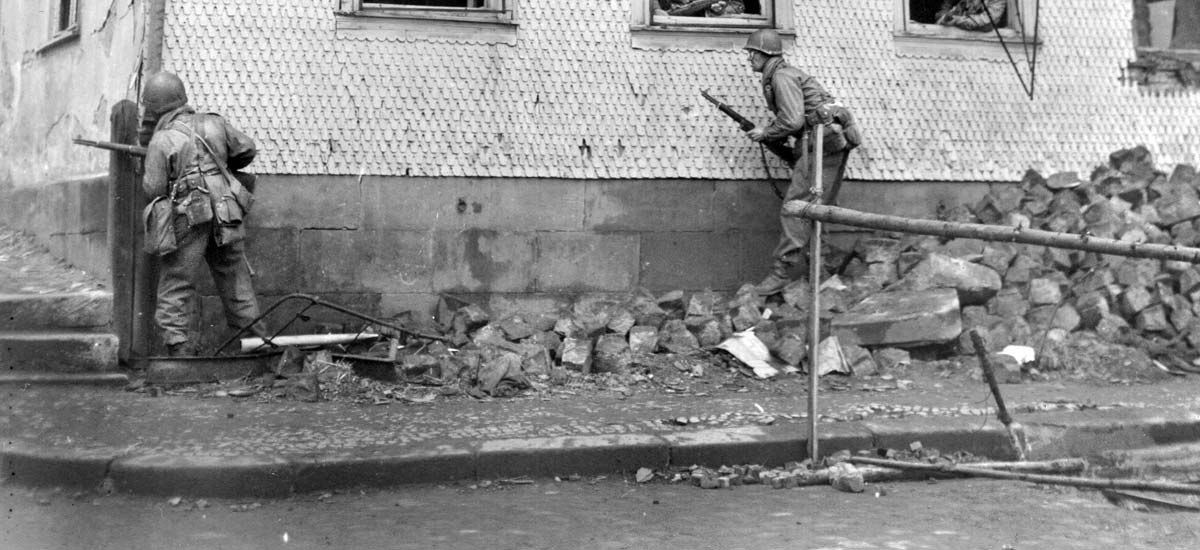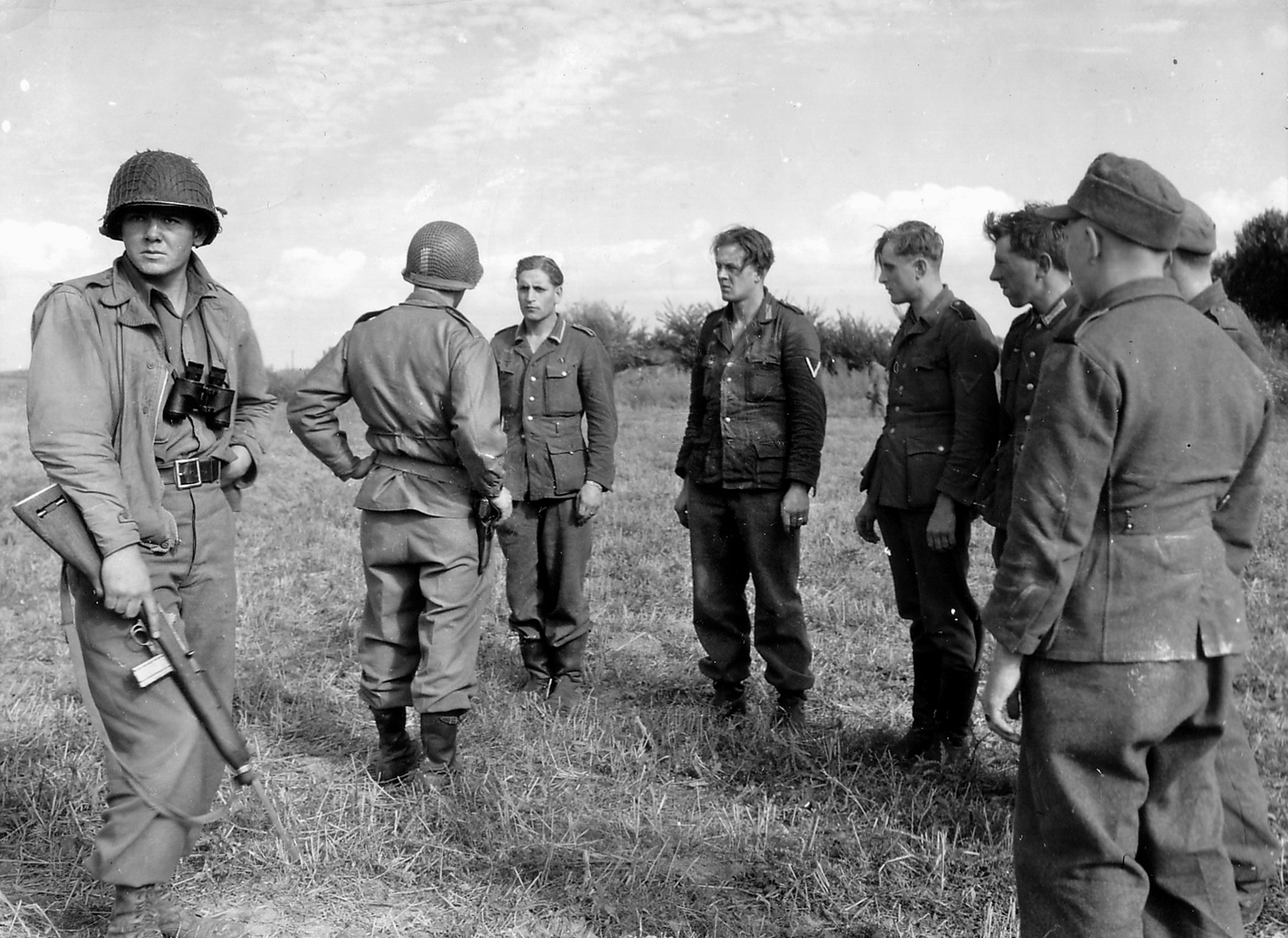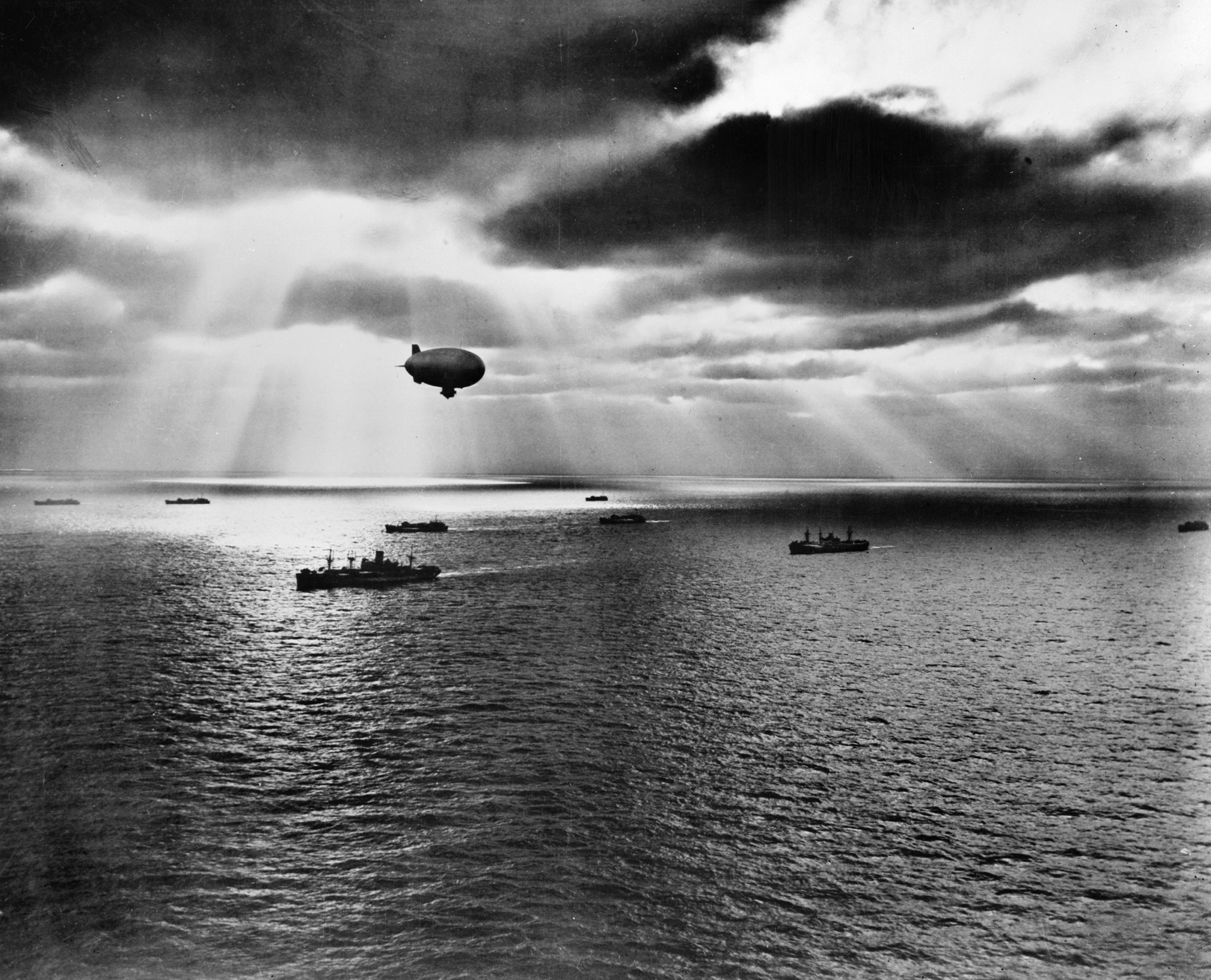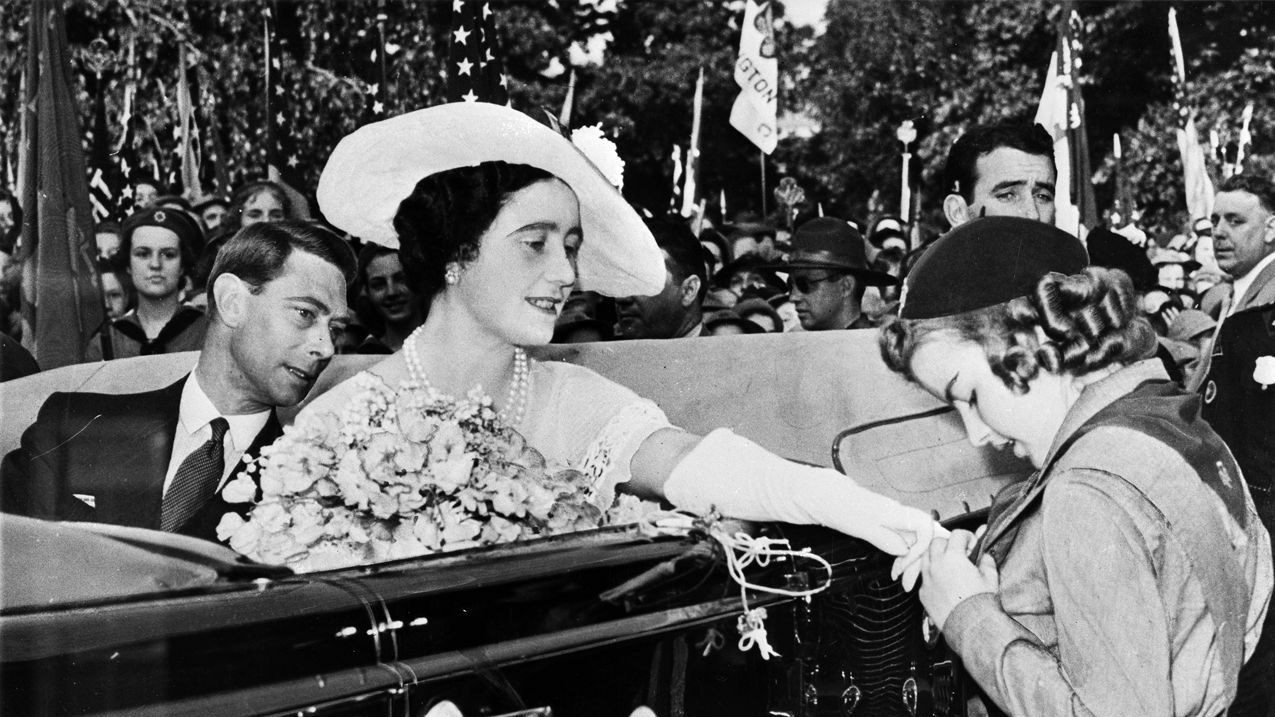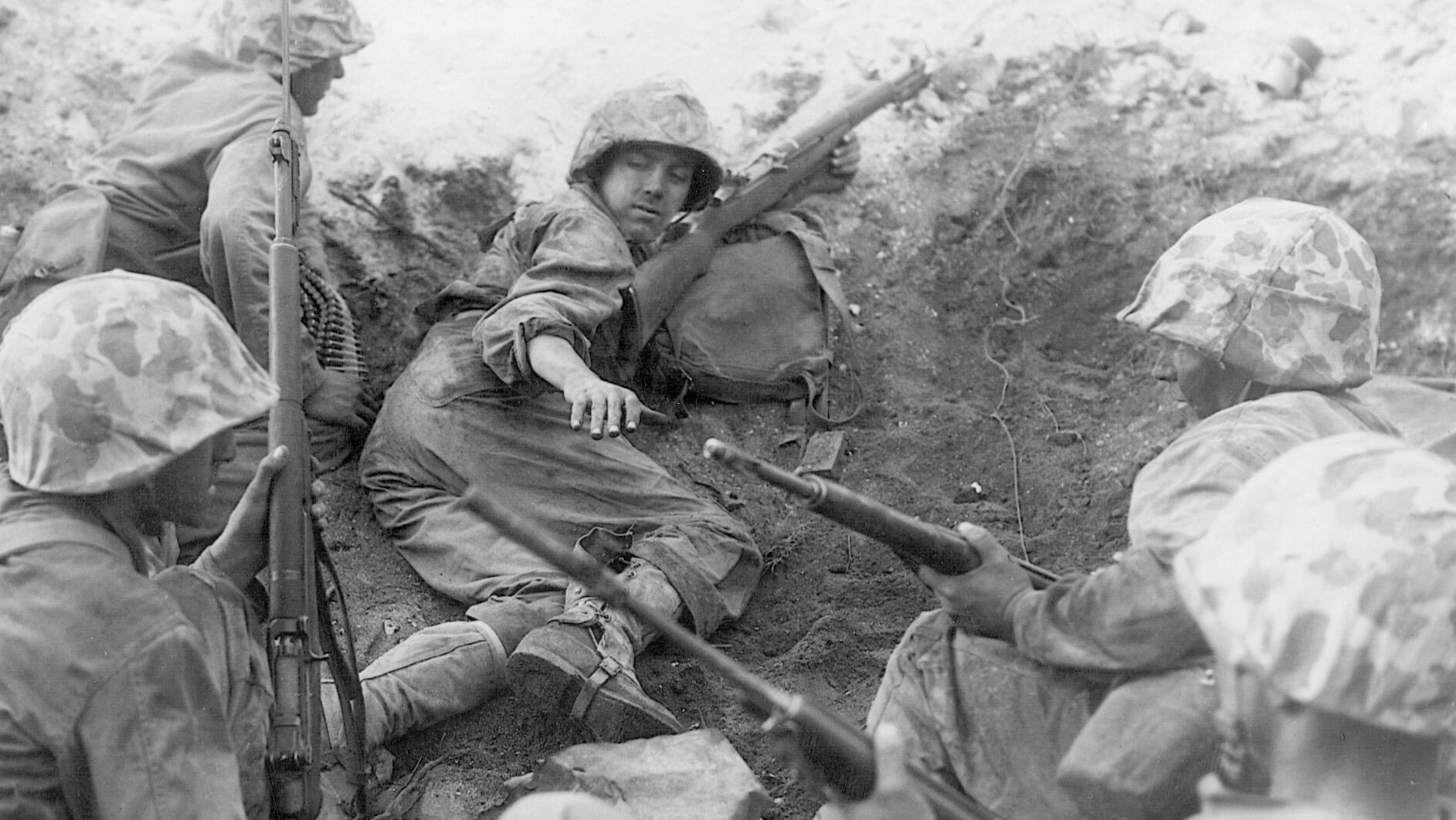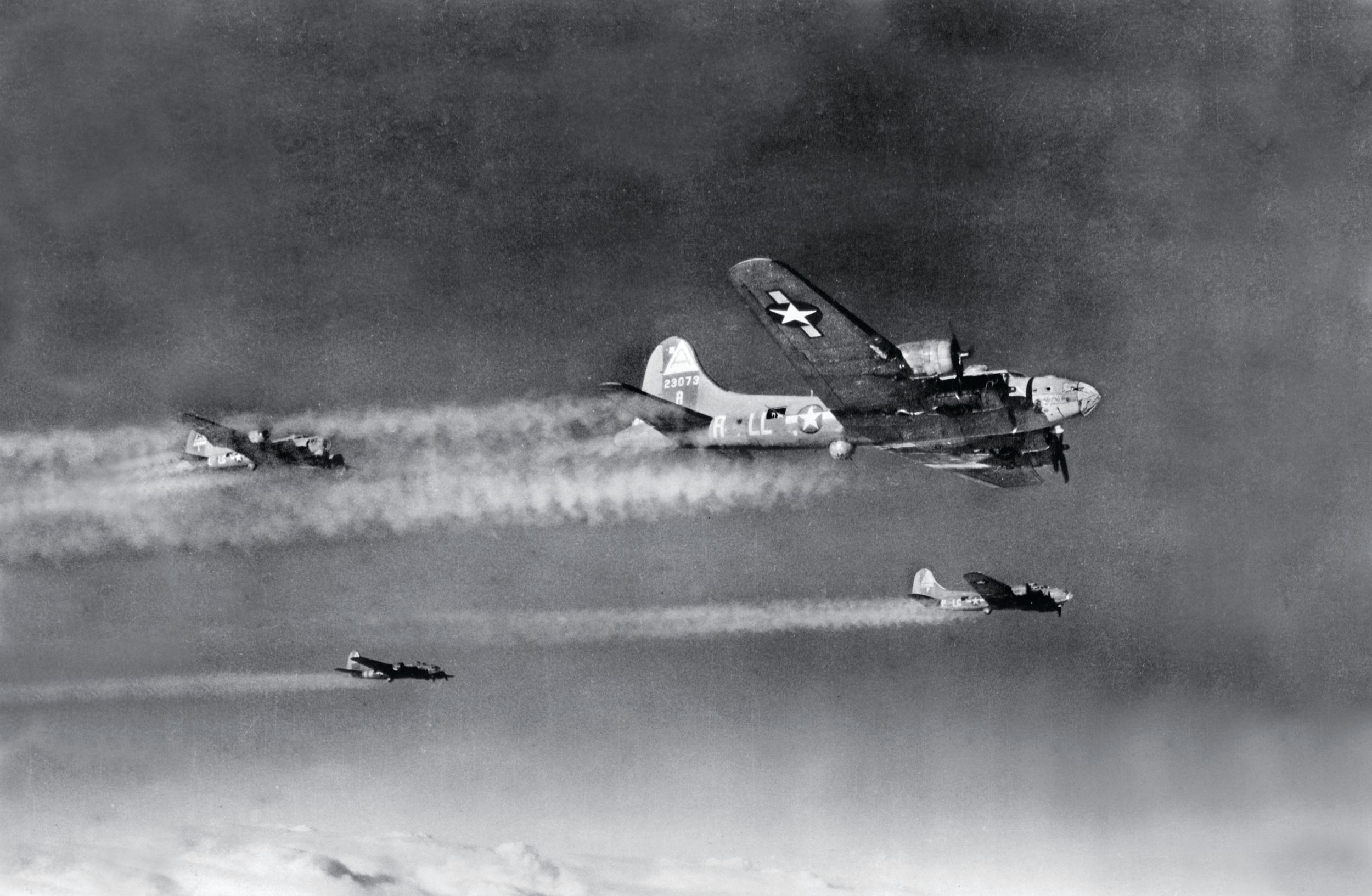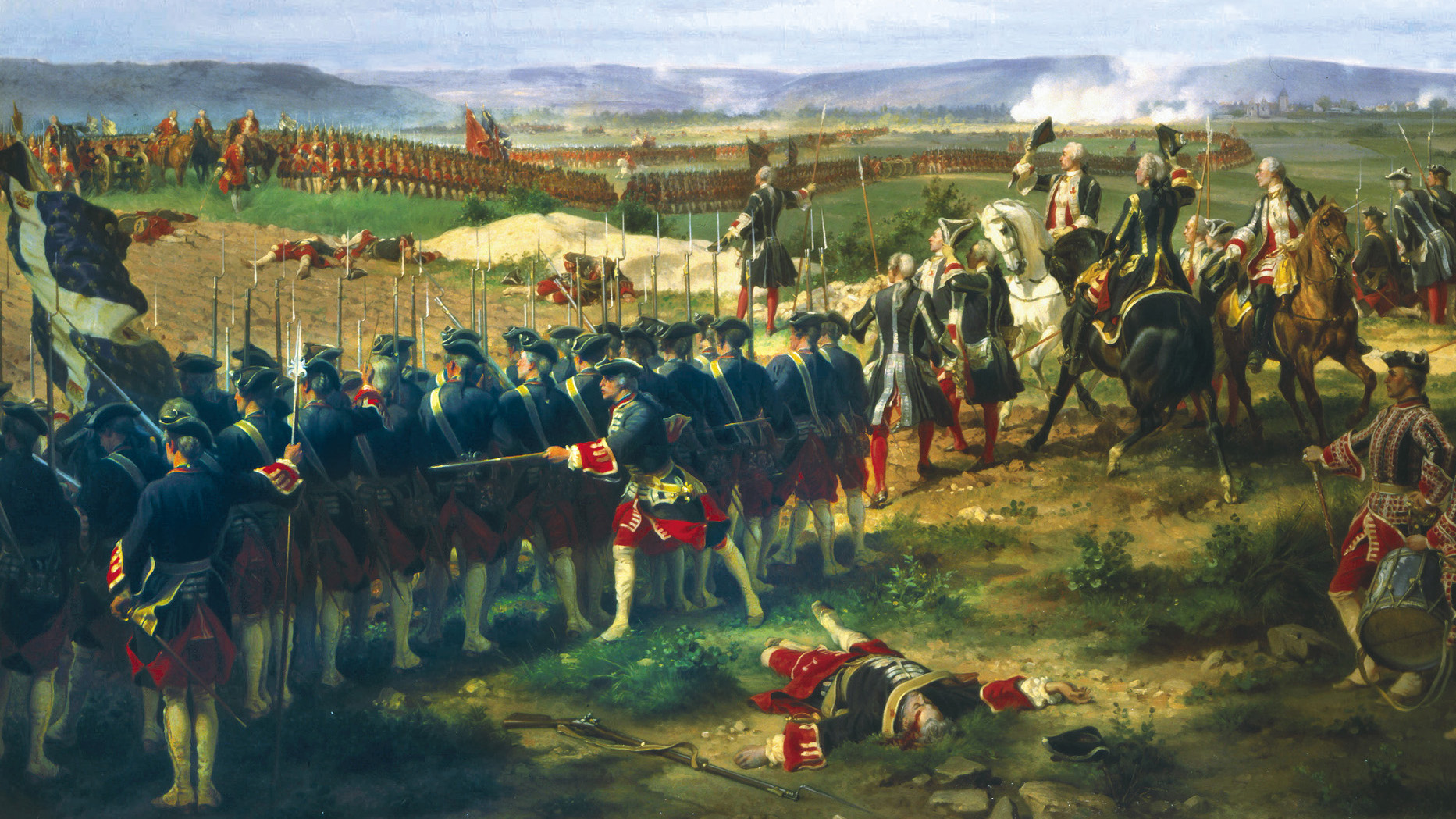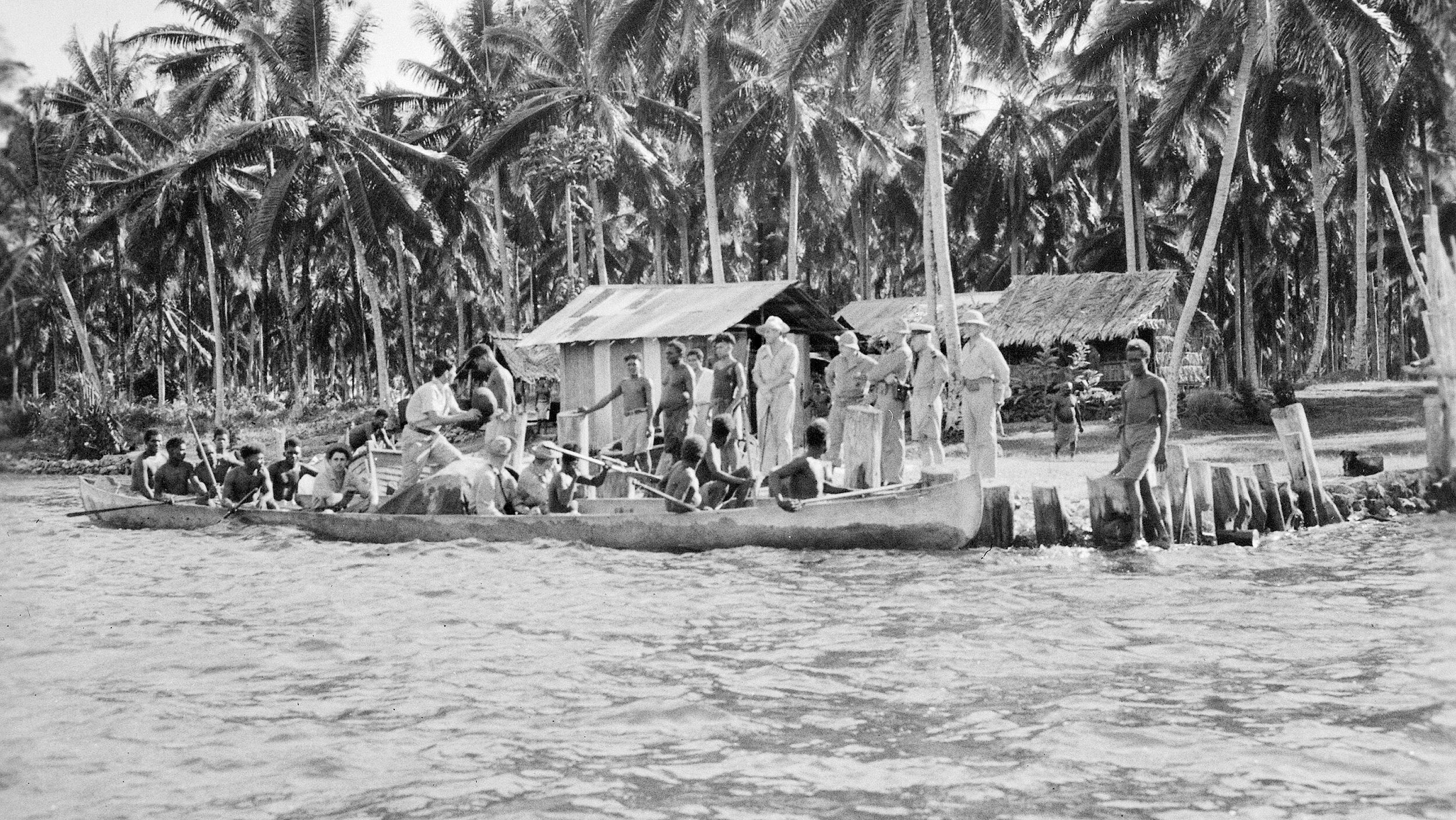By Roy Altenbach
Roy Altenbach, a soldier from a German-speaking family in Sheboygan, Wisconsin, was assigned to the 47th Medium Maintenance Company, 22nd Ordnance Battalion. After several months of training in the States, his unit shipped out for Northern Ireland, then headed for Scotland, England, and France, arriving in Normandy in July 1944. Prior to going overseas, he was married to Ethel Scott, a librarian in Sheboygan, and they exchanged hundreds of letters until his return. His memoir is based on their correspondence.
When I went into the Army, I was 23 years old, and it was the first time I’d really been away from home and family. Naturally, I was somewhat scared and apprehensive as to what would happen. By the time I went in, just about everybody I knew was in the service, so I was looking forward to getting in. I made up my mind that I was going to experience as much as possible. I did my share of bitching and complaining but took every advantage of seeing and doing interesting things.
THURSDAY, NOVEMBER 18, 1943. After crossing the Atlantic, we arrived in Larne, Northern Ireland, were fed, then boarded a train for Belfast. We changed trains and ended up in Lisburn and were trucked to Camp Knockmore, our final destination. I was assigned to the 22nd Ordnance Battalion. Our shops were much more elaborate than we ever had in the States. I went to work in the paint shop and, because I was a pretty good artist, was made battalion sign painter. I really enjoyed the job and was kept plenty busy.
Movement of units to the southern part of England was taking place in preparation for the Normandy invasion. On May 22, Altenbach’s unit was moved from its camp on the English-Scottish border to Camp Water Eaton in Staffordshire, West Midlands, near the site of an ancient Roman fort.
TUESDAY, JUNE 6. D-DAY. The day that we had all been waiting for. I sure hoped that this was the beginning of the end and that soon the war would be over. We spent most of today listening to the radio and thinking about the fellows who went in. The heavy bombers flew over, going and coming from missions by the hundreds. Often we saw them with engines that were not working, and we could often see damage on some of the planes. A lot of times we saw small rockets fired from planes. We were told that it meant they were in trouble and needed to land first, or that they had injured on board. It sure gives you a weird feeling to know that something is wrong.
In late afternoon of the 6th, we saw a formation of planes that were towing gliders go over heading south. The sky was thick with them. There must have been 200 or 300 of each. They kept going over for a half hour at least.
While waiting to head for France, Altenbach received a cablegram from his wife Ethel informing him that their son, Joe Scott Altenbach, had been born. On July 10, 1944, a month after Operation Overlord began, Altenbach’s unit departed Water Eaton for Weymouth on England’s southern coast.
MONDAY, JULY 10. We left Water Eaton by convoy. I was assistant driver of a 2½-ton GMC 6×6 truck with a trailer. We had to travel with the tops down, and it rained a good deal of the time. I drove about half of the trip but enjoyed the sights more when I was not driving.
It was interesting, when we got close to the coast, to see all of the equipment that was waiting to be moved over to the Continent. All the fields were full. Endless stacks of wooden boxes piled high. Other fields of trucks, jeeps, tanks, and artillery, etc. They stretched as far as the eye could see. It was almost unbelievable. We arrived at the marshaling area near Weymouth at about 8 pm.
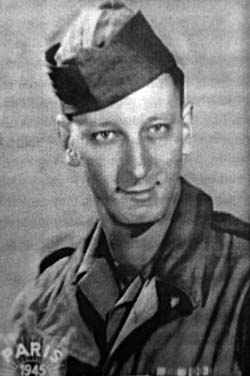
THURSDAY, JULY 13. Yesterday and today we kept busy working on our equipment, such as camouflage nets, etc. We had our money changed to French invasion money. We were issued rations and a lot of things we would be able to use later. We also loaded our truck and trailer with five-gallon cans full of gas. The company also drew a lot of extra vehicles. At 8 pm, we got orders to move out at 11 pm. We had to put on our impregnated clothing for protection against a gas attack; it sure is stiff and it stinks.
We moved out and went several miles to a place where we were lined up to board an LST (Landing Ship, Tank). While there, we were given a hot meal. We boarded LST No. 497; it was a real nice, clean ship. It had been used in the invasion on June 6. There were nice quarters for us; each of us had a bunk and white blankets. It sure was good to sleep in a warm, dry place after having spent more than two months sleeping in tents and on the ground. There was plenty of hot water and showers, which was a real treat for us.
SUNDAY, JULY 15. We took off at 5 am in a big convoy of LSTs; later, a lot of freighters joined the convoy. Several of the ships had barrage balloons to keep aircraft from strafing. We sighted the coast of France at about 6 pm.
As we got near the beach and waited, the Navy made ice cream for us. That was quite a treat because we had not had any since we went overseas. We also saw all the wrecked ships and equipment in the water and on the beach. It was unbelievable to see all the destruction.
A short time before midnight, we got orders to start the engines and prepare to move off the ship; I drove the truck off the ship onto the beach. By this time it was dark, and the MPs were directing us. As we left the ship, a German plane showed up. The antiaircraft guns lit up the sky. A little later on the road, we came to a stop and another plane flew over and the AA opened up again.
I sat on top of the load of gas cans and watched the fireworks. We heard some voices off to the side of the road but did not pay much attention to them. It was a heavy AA gun, and suddenly they fired. What a jolt! The truck shook like the dickens.
We drove several miles inland to a collecting point near Isigny. We got there at about 2 am and bedded down for the rest of the night. We attached to the 35th Infantry Division in Patton’s Third Army.
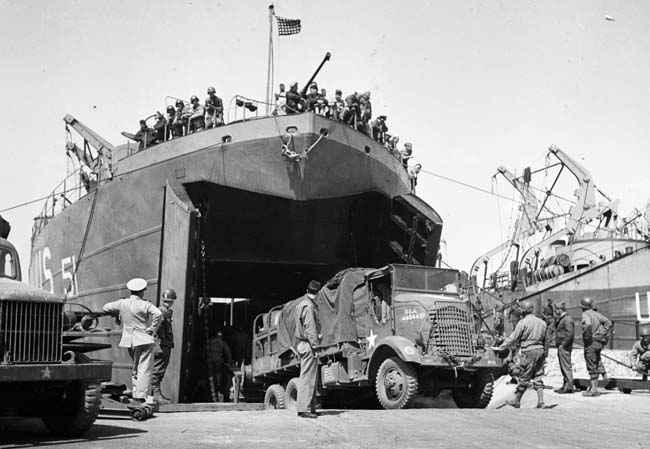
MONDAY, JULY 17. We moved to an area about six miles north of St. Lô and about two miles east of Ariel. We were about three miles behind the lines. The fighting was really bitter at the time. Every evening about dark we would watch the American fighter planes head back to England. A short time later, the Germans would show up and, of course, AA would light up the sky. It was better than any fireworks I have ever seen!
One day a German plane flew over our area, very low. We could see the pilot, and the plane was smoking; we saw it crash several miles away. I later talked to a fellow who said the pilot bailed out and came down near First Army headquarters. As he came down, all the headquarters clerks and messengers shot at him, but nobody hit him. He hoped the pilot did not get back to Germany until the war was over because his report would have been great for the Germans to hear what lousy shots the American GIs were.
FRIDAY, JULY 21. We went within one kilometer of St. Lô, and it was a sight I will never forget. The city had been occupied only the day before, and we were almost at the front at that time. There were wrecked vehicles everywhere and a lot of dead cattle and horses, which were all bloated. There were dead American and German soldiers, too, mostly in the ditches. They were also bloated, and it was terrible to see them.
At the time, they were not picking up dead GIs because so many of them had been booby-trapped. Of course, the smell was overpowering. It made me realize how awful war really is.
While I was in the area, a 6×6 truck came by with a full load of something. As it passed, I saw it was stacked full of dead American soldiers!
There was a crossroad at the edge of St. Lô where MPs were directing traffic. We stopped to talk with them, and they gave us information on the area. While we were there, a command car drove up with several colonels in it. They talked to the MPs and learned how close they were to the front. Immediately, they had the driver make a fast U-turn and drove as fast as hell to get out of there. That day we also drove through Ariel; the town was a complete wreck—there was not a building standing.
TUESDAY, JULY 25. This is a day I will never forget. At about 10 am a big flight of B-24 bombers came right over us, opening their bomb bay doors. When they got over St. Lô, they started dropping their bombs, and we could see them falling. Of course, the German AA opened up, and we saw three planes go down.
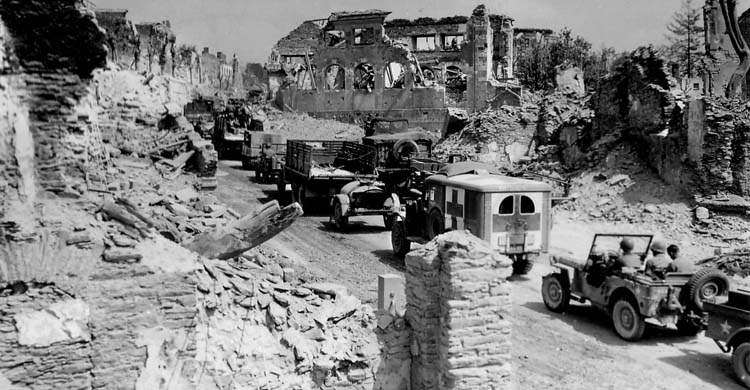
There were little artillery spotting planes flying below the bombers, which would radio to the heavy artillery the locations of the German AA guns. There were some big guns close to us, and they, along with the artillery all along the line, opened up. After a short time, there were no more puffs of smoke from the AA, and the rest of the planes had no problems from the ground.
After the heavy bombers had flown over, there were several hundred dive bombers, then hundreds of medium and attack bombers came through. They just kept coming. It was quite a sight to see. All the while they were bombing, the ground shook under us.
One of the first formations that went over had a plane fall out of the formation and at the same time dropped its bombs fairly close to us. Some time later, I noticed another plane drop something. A few seconds later, there was a terrific whistling and explosion. The plane had dropped its bombs, no doubt by accident. They hit only two fields away from us! We all made a dive when we heard that whistling.
I was on guard duty later when the AA opened up, and the shrapnel hit my helmet and shoulders. I crawled under a truck and could hear it hitting the vehicles and the ground all around me.
Later we read in the Stars and Stripes (our Army newspaper) that there were 3,500 planes in that raid and that it was the biggest air raid in history. It blasted open the way for General Patton and the Third Army to start the drive across France. Also on that day, our own planes dropped bombs in the wrong place and killed General Leslie McNair, head of Army ground forces, and quite a few American GIs.
At the beginning of August, we had moved south of St. Lô near the Vire River. Destruction was everywhere. I did not see how the French could stay so cheerful. Many of them were living in homes that had very little of the roof left, and often whole walls were missing, with very few panes of glass left intact. Yet on every windowsill of the house they had flowerpots with flowers blooming. You would have thought there was not a thing wrong anywhere around them.
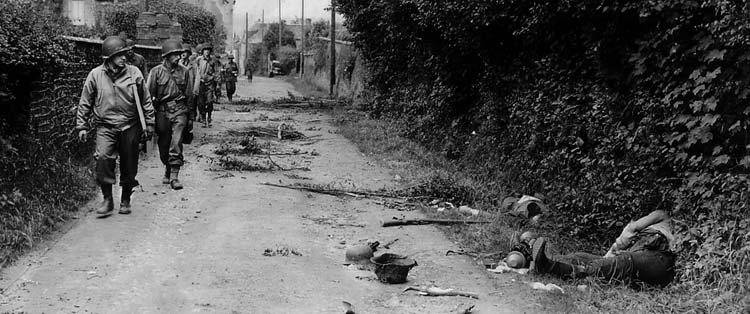
In general, the French people treated us very well. The farmers would trade fresh eggs for candy, cigarettes, soap, and anything like that. The women washed our uniforms for us, too. They also brought plenty of wine, cognac, cider, etc., and dished it out freely. Drinking sure is the national custom here.
Another custom was handshaking, and every Frenchman who came along shook hands with everyone he saw. Lots of times he would have his whole family along, and by the time you shook hands with all of them, your arm ached.
Somewhere in this period of time, near Le Mans, we were going down the road with hundreds of vehicles in a convoy; there was a dead German soldier lying with the upper half of his body on the shoulder of the road and his legs and lower body on the road. The vehicles kept driving over him, and he was flattened from the waist down.
One day we got word that Third Army had liberated a big warehouse full of liquor, and each of us would get two bottles of champagne and one bottle of cognac. Boy, talk about a bunch of drunks! It sure was fun while it lasted.
SATURDAY, SEPTEMBER 2. We were about 10 miles east of Sens and were having lots of rain, making things miserable. The days were getting shorter now; soon it would be winter again.
The battle plan had called for the Third Army to get to the area of Nancy, France, by May 1945. Patton surprised everyone by getting there by early September 1944—a little more than a month. (Third Army started out on August 1 from the St. Lô breakout.) Patton’s run across France was the most territory captured in the shortest time in history.
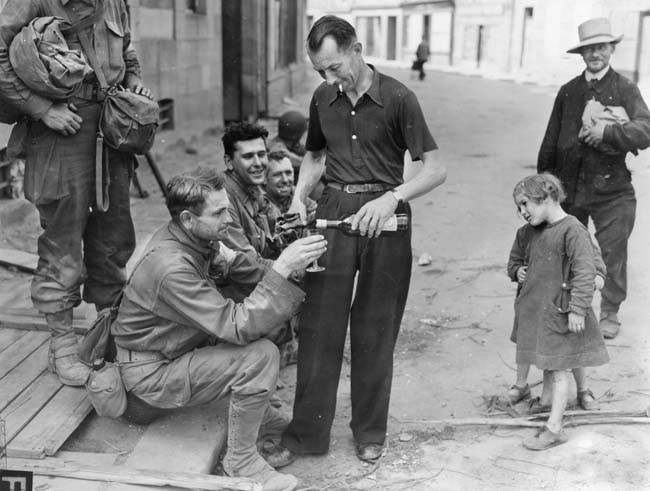
About this time the Army started the Red Ball Express. The Third Army had gone across France so fast that supplies just couldn’t get to the front, so they got all the available trucks and set up a 24-hour daily run. They made some roads one way east and others west.
WEDNESDAY, SEPTEMBER 27. We moved to the Chateau du Monet near Nancy, which overlooked the city. Here we lived indoors for the first time since Ireland. It rained a good deal of the time we were there and everything was mud.
One day when we were in Nancy, there were mobs of people in town. We were told that General Charles de Gaulle was coming, and we got to see him arrive in a big, open car. Then he got up on a balcony and spoke to the crowd. They sure gave him a rousing reception.
Another time we were in Nancy on a pass. A buddy and I were walking down the street and heard sirens. Coming our way were two motorcycles with red lights and sirens, driven by MPs. Behind them was General Patton in his olive-drab Cadillac. Naturally, we saluted, but he was just a blur.
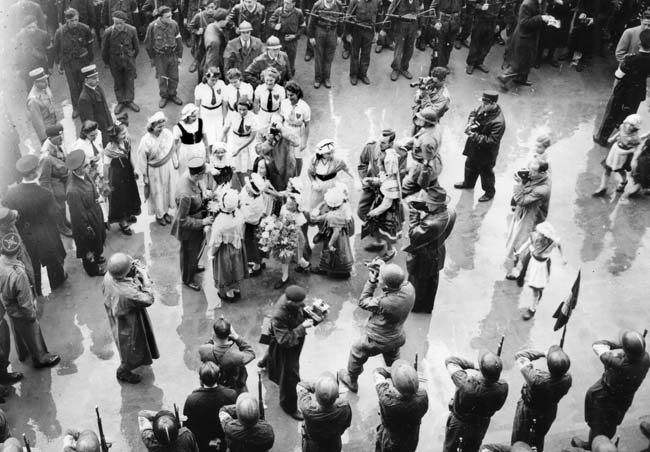
Also in Nancy there was an area of brothels. It was interesting to see the GIs lined up out in the street, waiting to get in. In a lot of the other towns, the brothel area was off limits. I heard later that Patton said the GIs should have them available and that the Army could check them for health reasons.
We were in Nancy for what seemed like a long time. The reason was that we did not have gasoline. General Dwight Eisenhower, Supreme Allied commander, decided to give the gas to Field Marshal Bernard Montgomery, and he got bogged down in the Low Countries. Eventually, the Americans had to rescue the British up there. Patton wanted to be in Berlin by Christmas, and I am sure we would have been—if we had had the gas. I spent a lot of time buying souvenirs and postcards. I also began to acquire a lot of German stuff—hats, helmets, swords, daggers, belts, pistols, etc.—and sent them home whenever I could.
THURSDAY, OCTOBER 15. The weather had been terrible. It was raining all the time and, of course, the mud was always getting worse. I thought I had seen mud before, but nothing like this! It had been getting pretty cold, and the leaves were falling off the trees. I hated to think of winter coming.
MONDAY, OCTOBER 30. This evening I saw Marlene Dietrich, the actress, in a USO show. It was quite a way from here, so we went in the back of a truck. With everything else she did, she played a musical saw. She was the first celebrity I had seen since I had been in France.
THURSDAY, NOVEMBER 23—THANKSGIVING. We got orders that we would move on Thanksgiving Day. We were going to a little town, Achain (past Chateau Salins) in northeast France. At about 10 am the convoy turned off the highway, and I was dropped off at the top of a hill to direct our vehicles to the town. The last vehicle was supposed to pick me up, but it didn’t, so I had to walk to town. It was rainy and windy and I was awfully cold.
There must have been some action up at the front because there was a steady stream of ambulances going back the way we had come. A jeep finally came and took me down to my group, which had moved into an undamaged house. All the civilians were gone and we were the only troops in town. Part of the town was in ruins, but our end was not damaged.
The town church was in the square across from our house. Apparently, German troops had been staying in the church, and they must have left in a hurry because there was equipment all over the pews. There was a shed at the west side of town with a dead German in it. At least it was cold, so he wasn’t bloated and smelling.
I was walking across a street and looked up to where I had been up on the hill. There was a jeep there, and suddenly there was an explosion. One of our men in a jeep went to investigate and came back and said that the jeep up on the hill had pulled over onto the shoulder and the passenger had stepped out—right onto a mine—and was killed. I don’t know how I had missed stepping on that mine because I had walked all over that area.
TUESDAY, DECEMBER 12. We had passes, so we did a little sight seeing. We drove in a 6×6 truck through Metz, Verdun, Chalons, and Paris. We went through Lisieux and Caen, which was in terrible shape. We arrived in Cherbourg in midafternoon on the 15th and went to an Army transient camp, which was all pyramidal tents. In the evening we went to the Red Cross club and drank coffee and ate doughnuts.
On Sunday the 17th we drove all day in a heavy rain and windstorm and passed through the Falaise Gap, which was really in bad shape. In August the Germans had been trapped there, and for miles their burned and blown-up vehicles and equipment were still stacked up on both sides of the road. There were also hundreds of dead horses. It was a scene of utter destruction.
We went back through Paris and stayed at a big department store that the Army had taken over for the billeting of troops. In Paris, everything was Army spit-and-polish; shoes were shined and uniforms were pressed. It sure was different from what we were used to at the time. It was interesting because we were in dirty fatigues and looked rough as hell. We were treated like heroes, and the big hit was our Third Army patch.
At this time, the Germans launched their counteroffensive into Belgium and Luxembourg that came to be known as the Battle of the Bulge.
FRIDAY, DECEMBER 22. The big news was the German breakout. We got orders to move north, through Metz. We left at 7:30 pm. It was cold and snowing, and the road was slick. I think we drove with headlights on; I guess Patton figured the Germans couldn’t see us, and it sped up the move. The whole Third Army (about 250,000 men) was in Belgium in about 48 hours.
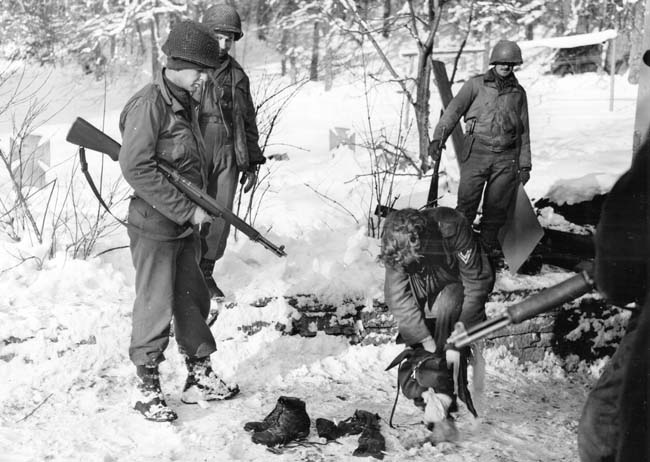
At the time of the Bulge, most of the troops up there did not have overshoes, and there was an awful lot of frostbite. Luckily, we hadn’t turned in our overshoes when we left for the Continent, so our feet stayed dry. The Army had figured that the war would be over by Christmas and didn’t ship much winter clothing. That sure backfired, and a lot of troops were miserable.
We drove next to a river. It was about 2 am, and there were floodlights, and troops were doing welding on several bridges. Suddenly all of the lights went out and the welding stopped. A German plane flew over, strafing. Of course, the antiaircraft opened up, but I don’t think he got hit; we could still hear the plane. All the lights came on and the welding started again. The whole incident took about a minute.
We continued on, driving through a part of Luxembourg. At about 10:30 pm on Christmas Day, we arrived in a woods at Guirisch, near Arlon in southeast Belgium. It was clear and the moon was real bright. There was snow on the ground and it was bitterly cold. I was on guard duty and about froze stiff.
On another night on guard duty, I saw a big explosion and fire south of us, about 10 or 15 miles away. We later heard that a trainload of ammunition had been sabotaged. We were told that the train was stopped when suddenly an engine came down the track at full speed and hit the ammunition train. It totally destroyed the town where it happened.
I never got up to Bastogne, but our contact parties did. They told of the destruction and the dead. Some corpses were leaning against buildings, and all of them were frozen in place. The bodies were not picked up until things settled down.
There was some concern at this time because we heard that, when the Germans broke out, they captured a lot of GIs and their equipment. They were dressing as GIs and driving our jeeps, etc. One night the mess sergeant asked me if I would go after a tank of water, so I got a ¾-ton weapons carrier and hooked up the water tank. As I started out, I realized I wasn’t sure about the password and countersign. I knew it was “Lincoln” and “Abraham,” but I wasn’t sure which was first. I got to the water point, got the water, and headed back, thanking my lucky stars that I made it that night.
One day, two of our fellows were on guard duty in the woods on the east side of town when they saw two fellows in American uniforms and no helmets. They said they had been in a convoy and had been left behind. The guards took them prisoner, took them to Arlon, and turned them over to the MPs.
SATURDAY, JANUARY 20, 1945. We left Belgium and went south to Metz, where we lived in a schoolhouse that had steam heat. That felt really good because it was very cold. Here we were assigned to the 26th “Yankee” Division and were with them for the rest of the war. We were now known as the 47th Medium Maintenance Company, a part of the 14th Ordnance Battalion.
MONDAY, JANUARY 29. After almost three weeks I finally got some mail from home. There was a Christmas package that was postmarked in October, letters and pictures from my wife Ethel, letters from my mom, and a letter from family friends who wrote that their son, a friend of mine who was in the Navy, had been killed in the Pacific. They were taking it very well and wrote that it was one of those things that could be expected in times like these.
TUESDAY, JANUARY 30. We moved to Gueling, a place about 30 miles east of Thionville. It was a German ammunition renovation plant. There were an awful lot of old bombs, shells, etc. lying around everywhere.
The next day I was on guard duty at the gate area. At about 10 am there was a loud explosion, and I saw one of our automotive shops blow up. The debris went way up in the air. The building had been in good shape when we moved in, but after the explosion it was pretty well wrecked.
What happened was, there was a booby trap in a stovepipe. The fellows had built a fire in the big stove to stay warm. Suddenly the fire flared up and they all ran out. Before they all got out, the bomb went off. It sure did a good job—two of our trucks in the building were badly wrecked, and four of our fellows were injured by fragments. None of them were hurt seriously, which was fortunate.
THURSDAY, FEBRUARY 15. I received a new jeep and lettered it “Scotty,” both for my son and for Ethel, whose maiden name is Scott.
SUNDAY, FEBRUARY 18. We were in the town of Wadgassen, northwest of Saarbrucken, Germany. Ted Leszkowicz and I had received permission to look for our buddy, Lou Kolnicki, who had been transferred to the infantry at the time of the Bulge. We had been told where his company was located, but when we got into the town we were surprised that there wasn’t anyone around.
We drove down one street, and there was a big tree blocking the road, a streetcar in the middle of the block, and the overhead wires were down. There were several undamaged autos on the street. The tree blocked our way, so we went back and took another street.
We got to a big intersection and stopped in the middle; suddenly, an American GI yelled at us to get the hell out of there and get behind the building where he was. He said that there was a German machine gun down the street that shot at anything that moved in that intersection.
We went inside with him, and there were a bunch of infantrymen sitting around, most of them asleep in chairs or on the floor. They said that the Germans must have been eating or something because any time anything moved in that intersection, they fired. I guess we were just lucky.
The group was Lou Kolnicki’s outfit, but he was out on guard duty in a foxhole. All at once there was a burst of machine-gun fire, and all of them jumped up and had their rifles ready. It sure was interesting to see the tension they were under.
We visited for a little while and then took off after they told us how to get out of town. They pointed up a hill and said, when you start up, go like hell, weave back and forth, and be sure not to stop because the Germans could see the whole hill.
After we got over the top of the hill, we saw some GIs in a foxhole. We stopped and talked with them and could see the way they were living; the hole was all muddy and so were they. After we left, we kept thinking how lucky we were that we could go back and have a dry bunk. Of course, our area was a sea of mud; the snow was melting and it sure was a mess. We never did find Lew Kolnicki. (He did visit our outfit on March 4, though.)
SATURDAY, FEBRUARY 24. I was transferred from being the battalion sign painter and put back into the automotive section as a mechanic. But I griped so much that they transferred me back to the service section a week later.
THURSDAY, MARCH 8. The company moved to Beurig, near Saarburg. Here we lived in a big hospital. On the trip we passed some of the “dragon’s teeth” on the Siegfried Line, along with a lot of abandoned German pillboxes and defensive positions.
The past few days were very nice. When it was nice here, the country was beautiful, but when it was miserable, it really was awful. We moved into some houses in a deserted town. We had a nice place to live in, but I didn’t like living in these towns. They were all smelly, dirty places, and now that it was getting warmer, it would get so much worse. For the next few days we were constantly on the move, staying in one town after another.
TUESDAY, MARCH 27. Ethel’s and my third wedding anniversary. Near Alzey, we left the area and were close to the Rhine. As we drove down the road, there were a lot of big boats off on the sides of the road. They were on big truck trailers, and there were a lot of U.S. Navy sailors with them.
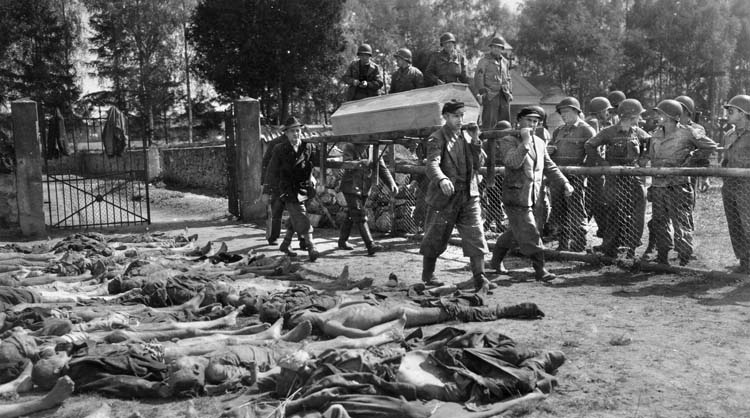
For a long time we looked forward to seeing and crossing the Rhine, but all we saw was smoke because there were barrels everywhere spewing out white smoke screens that hid everything, This was to protect the pontoon bridge from German strafing. At Oppenheim, we crossed the river at about 11 am, and all we saw was the back of the vehicle ahead of us and the water between the pontoons.
After we crossed the Rhine, we continued on to Darmstadt, arriving about noon. We stayed in the Darmstadt Locomotive Works and slept in the office building. There were locomotives in the shop, and most of them were shot up. At the railyard, hundreds of civilians were looting boxcars on the tracks; I don’t know what they were taking, but they looked like a bunch of ants moving all over the place.
SATURDAY, MARCH 31. I wrote a letter to Ethel’s mother and said that I was glad the war was over here and not back in the U.S. because so many cities were absolutely leveled. A person could see what our air force had been doing for the past couple years.
We were now located at the airport north of Hanau, which was about 12 miles east of Frankfurt-am-Main, but got orders that we would soon be moving to a new location southwest of Fulda.
An ordnance officer in our battalion, 1st Lt. Thomas Creswell, wrote the following account of our convoy’s road march to Fulda:
“At 1830 hours, Lieutenant Keifriter, who had gone ahead to recon the route, returned and informed us that he had run into a German pocket approximately 35 miles to the north and that they were being engaged by the 818th Tank Destroyer Battalion.
“An hour or so later, Lt. Col. Johnson, commanding the 14th Ordnance Battalion, informed us that a strong force of Germans had overrun an ASP [ammunition supply point] a few miles to the north and for us to strengthen our guard and not leave until morning.
“At 0700 hours, 2 April 1945, our convoy cleared the airport at Hanau and headed northeast on Route 40. We turned north at junction L-549 and moved on to Budigen. Here my vehicle, which was leading the convoy, had a flat tire, and Lt. Keifriter took the convoy on. I fell back into the middle of the convoy.
“At approximately 0830 hours, we passed through the small town of Wolfborn. Our last vehicle had just cleared the town when a 2½-ton truck from a combat engineer battalion containing two enlisted men overtook us and informed us that they had just outrun German personnel in American vehicles on road L-514, between Lissenwald and Wolfborn.
“He could offer no other information other than the Germans seemed to be in strength and had vehicles and weapons. At that time, a field artillery observation plane circled, then came in and dropped a message stating that strong forces of enemy personnel and vehicles were in the surrounding woods.
“The leading vehicle of the column was at the outskirts of Kefenrod. Looking into the town to a ‘T’ crossroad, we could see six American vehicles strewn about the center of the road, with tires deflated, windshields full of holes, and hoods raised. It gave all indications that the occupants of those trucks had run into trouble recently.”
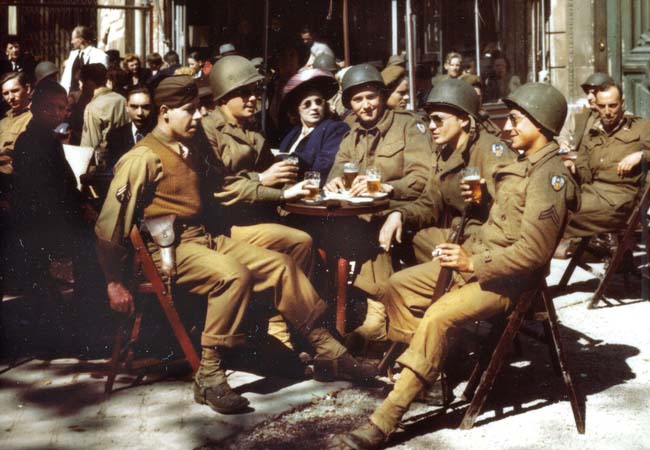
Lieutenant Keifriter quickly organized a squad of men, supported by a bazooka, and advanced into the town. A German soldier was seen driving a jeep but escaped.
Creswell continued, “Further on, Lt. Keifriter and his squad encountered some enemy troops and opened fire. They fought from street to street, finally clearing the town. It was quite evident that the town had been headquarters for those enemy forces in the surrounding woods. Results of action were one enemy killed, one wounded, and two captured, one of which was an officer…. All evidence indicated that we were completely encircled by the enemy. A perimeter defense was established.
“Within the town was a German field hospital with three medical officers, six nurses, and approximately 150 enemy wounded soldiers. One nurse spoke English and, on questioning, told us that the Germans had re-entered the town during the night and taken the American soldiers that had been there.
“All the civilians in the town were gathered up and assembled in the town square. They were informed [by the Germans] that the homes of those harboring enemy military personnel would be destroyed. That threat netted six more [American] prisoners.”
Creswell then wrote that the company was being harassed by Germans hiding in the woods around the town but that return fire from our .50-caliber machine guns killed a few, wounded others, and caused several to surrender. Interrogations of the prisoners revealed that the German strength was anywhere from a company to a regiment.
At 11:30 am, a half-track from a tank destroyer battalion arrived from the north, and the driver reported that he had seen some enemy in the fields but had only been fired on once. Because our ammunition was running low, our officers decided that it would be unhealthy to stay overnight in the town, and so the decision was made to make a run for it, heading north out of town with the half-track leading the way.
At noon we began our departure, with the half-track firing bursts into the wooded areas around the road. A column of M-8 armored cars was encountered going south, and we made it out of the area without further incident.
Somehow, several of us got separated from our convoy. We stopped before dark in the town of Herbstein. We spent the night with a medical outfit and got to sleep with sheets on the bed. What a treat!
TUESDAY, APRIL 3. We got back to our outfit about noon. They were in a field outside the town of Unterluder. The company was sure glad to see us. They were afraid we had been caught in one of the many counterattacks the day before.
WEDNESDAY, APRIL 4. We moved to Hunfeld, north of Fulda. I was put on guard duty at a big German hospital. When we arrived, I was the interpreter with the nurses. We told them we wanted beds. They opened a big ward, and we all had beds with sheets. The head nurse complimented me on my German and asked where I had learned it. I told her, “in school;” I didn’t want her to know that I had learned it at home.
The next morning an Army outfit came and took all the patients who could walk to a POW camp.
FRIDAY, APRIL 6. We moved to Wasungen, where we lived in the railroad station. My group lived upstairs in the stationmaster’s quarters. It was a regular home, and there was a big closet with a lot of German officers’ uniforms. Of course, we looted the closet. I found a major’s silver saber with a gold handle in a cloth holder, which I still have. I also found a shoulder holster.
The big find was a big photo album. It showed the major as a boy in a Hitler Youth group carrying shovels with swastikas on their shirts and armbands. We looked at the album and then threw it in the stove; I’ve been sorry ever since—it was the perfect example of a person’s life under Hitler.
THURSDAY, APRIL 13. We were in Suhl, where we were billeted and worked in the Gustloff-Werk, which was a gun factory. We helped ourselves to many rifles and pistols, Nazi flags and banners. I mailed a Nazi flag and banner home. Our small arms section had a field day with all the pistol parts. Here we learned that President Franklin Roosevelt had died.
MONDAY, APRIL 16. We moved to the town of Helmsbrechts, where we lived in a small textile mill. In the owner’s house, there was a bathtub and an electric water heater. That tub was used 24 hours a day while we were there.
During this period, I would usually go as an interpreter with the advance parties looking for new locations for billets. We would go up to a house and knock. When someone answered—almost always a woman because the men were all in the service—I’d hand them a paper and tell them they had 20 minutes to get out and could only take the things listed on the paper.
They never objected, and when we came back they were gone. One woman asked me if there’d be any more shelling or bombing, and I told her no. She was so relieved and said, sure, we could have the place. We never knew where the people went and at that time we didn’t care.
FRIDAY, APRIL 20. Hitler’s birthday. We went on a reconnaissance with Lieutenant Kelleher, looking for a new area. We were with a group from the battalion, and a major was in charge. There were six jeeps and a command car. One jeep had a .50-caliber machine gun.
We got to the town of Kemnath at about 11 am and stopped outside the town and waited. The orders we had were that the Infantry would take the town at 11:20 am. At about that time a convoy of 6×6 trucks came along. They stopped and all the GIs piled out and headed into town. Later, we saw civilians using pitchforks to bring German soldiers to the GIs to turn them in.
At the time, the Americans had spread the word with leaflets that if any shots came from the town the place would be destroyed, so the civilians weren’t taking any chances. After that, we went through the town, and all the people were waving white handkerchiefs at us.
Later that day, I was riding with Lieutenant Kelleher, and we were approaching the town of Waldeck when shots started whistling over our heads from the town up ahead. We all pulled over, ran to a field, and got behind a ditch bank. The jeep with the .50-caliber started firing at some motorcycles on a road up behind the town. The .50-caliber knocked one German off his motorcycle, but then the machine gun jammed.
All we had were carbines and they were useless at that distance. The Germans kept firing every once in a while to keep us down.
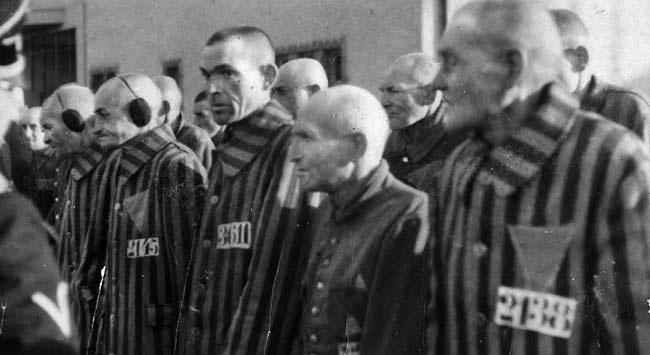
As we lay there, I looked behind us and saw dirt kicking up. Apparently, someone was firing at us from a woods up a hill to our right. I yelled to the major and, when he saw it, he yelled to head back to the vehicles. As we started to run, they opened fire on us. I jumped in my jeep and started it; about that time the lieutenant jumped in. I made a fast U-turn and started to weave down the road. We all drove like hell until we were out of range.
When we stopped to check on everyone, we discovered that when we had first stopped a bullet had come through one of the windshields just as the officer had jumped out—it would have gotten him in the throat if he’d been there—then it went into the spare tire. One of the jeeps had a front tire hit and, of course, he drove on the flat.
We went back to Kemnath and learned that the infantry had gone north and south, and we were on our own. We went into a building; I think it was the town hall or a school. It was two stories, and another fellow and I were sent to check upstairs. We went room to room looking for anyone hiding.
If a door was closed, we’d turn the knob, then kick it in, with our carbines at the ready. In one room we heard some noise. I had a pistol so I drew it, gave the door a good kick, and we headed in. There were a bunch of slave laborers in there who were more scared than we were, but happy to see us.
TUESDAY, APRIL 24. We moved south to Schwarzenfeld (approximately 30 miles north of Regensburg) in Bavaria, where we saw some of the German atrocities. We saw 40 slave laborers who had been starved, killed, and then buried in a big trench. The military government had German prisoners dig them up. Then they had the civilians in the town build coffins to rebury them. The next day we saw the reburial of 120 slave laborers who had been killed by the Germans.
As thin as those corpses were, they probably were better off dead. The thing is, they were mistreated to start with and then starved to death. It sure ends any positive feelings a person might have had for the Germans.
THURSDAY, APRIL 26. While moving to a new location, we saw hundreds of slave laborers along the road. Apparently, the Germans left them behind and didn’t have time to kill them. They were really a pathetic looking lot and an awful sight to see. They were in striped outfits and were just skeletons. They just stared at us and didn’t even wave.
We threw some of our rations to them because we were moving and couldn’t stop. One old man (at least he looked old) was sitting on a stump or a rock right next to the road. I threw something to him, and it landed right at his feet. He leaned forward a little, but he couldn’t pick it up. The picture of that is still clear to me and has always bothered me.
I’m sure some unit got to them and took care of them. We also saw quite a few who had died and were lying along the road.
FRIDAY, MAY 4. The news here keeps looking good, but still some of these crazy Germans fight on as if they had a chance. The war is winding down, and Germans are giving up by the thousands. We moved to the town of Untergresbach, 15 miles east of Passau. When I’d go on runs with the jeeps, I’d see German soldiers lined up on side roads waiting to give up. They were all on horse-drawn wagons.
Early one morning, I was on guard duty along the road into town. About 6 am, a German truck came up the road heading into town. The truck was an open flatbed with removable side gates. It was packed with German soldiers, and they were all waving white handkerchiefs.
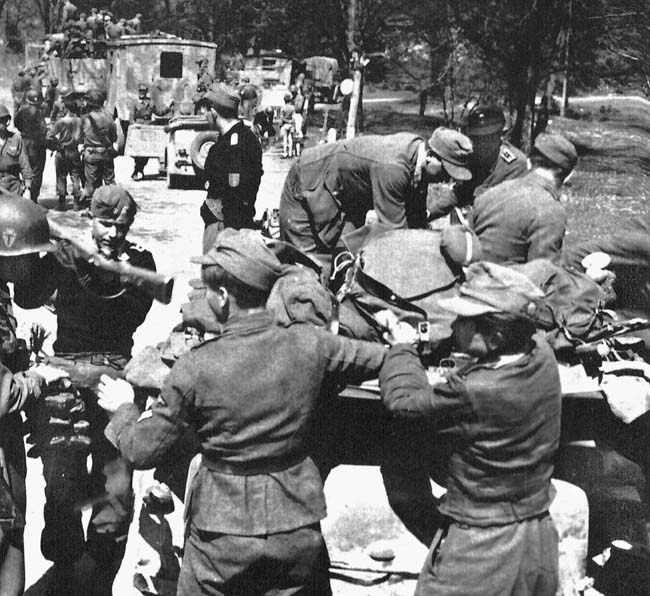
The truck stopped. They wanted to surrender to me, but I wasn’t about to take 30 or 40 prisoners, so I sent them into town because I knew there were MPs who could handle them.
A day or so later, we got word that a German division had surrendered and they’d be moving into the field across from us. When they arrived, they only had horses and wagons, and most of them were walking. Some of our guys took the horses and used them for horseback riding.
The Germans had their rifles and carried them on guard duty, just like we did. We walked up and down on our side of the road, and they walked on their side with their rifles. After a few days, they started piling up rifles at the edge of the field right across from us. There were thousands of them, and it was one heck of a pile.
TUESDAY, MAY 8. We had moved from the location at Untergresbach, but I don’t remember where we were. We were called out in formation in late afternoon, and the company commander made the official announcement that Germany had surrendered. While we were in formation, a German plane came over real low, had his landing gear down, and was tipping his wings from side to side. He was surrendering to the U.S. rather than to the Russians. We heard that there were lots of pilots that did that.
There wasn’t much celebrating, except that we were glad it was over. The word was that we were going to the Pacific, and we weren’t happy about that. Later, when the atomic bombs were dropped, everyone was relieved, but there never was any real celebrating, even when Japan surrendered.
WEDNESDAY, MAY 16. I had really been covering a lot of miles lately in my jeep, “Scotty.” Almost every day I drove along the Danube River, and it was really beautiful along there.
I sure hoped that my son Scotty would never have to see or go through a war. I never really had it tough like the infantry, but I was scared a lot of the time and had it a lot tougher than a lot of service troops. I had seen enough to make me sick of war and everything about it. The only thing I missed about it was all the good friends I made.
In late May, Altenbach and some of his buddies had passes to head back to Paris, Belgium, and Luxembourg to see the sights, buy a few souvenirs, and enjoy the end of the war. In June the company was transferred to a new battalion and sent to Pilzen, Czechoslovakia. Then it was back to Germany where he received orders that he was finally going home. It was not until October 22, 1945, that he boarded a Liberty ship with a few thousand other GIs and headed west across the Atlantic toward Ethel, Scotty, and home.
